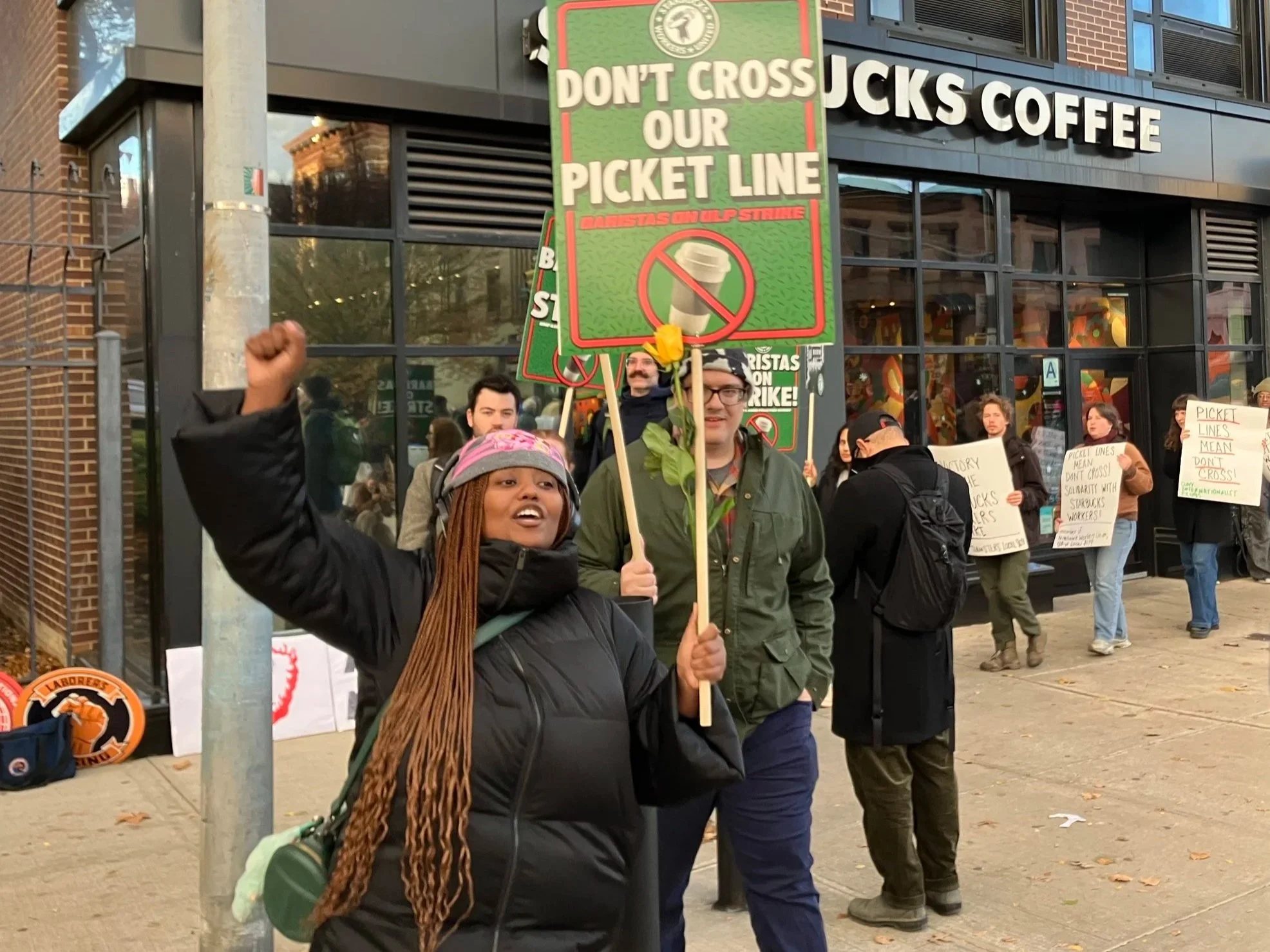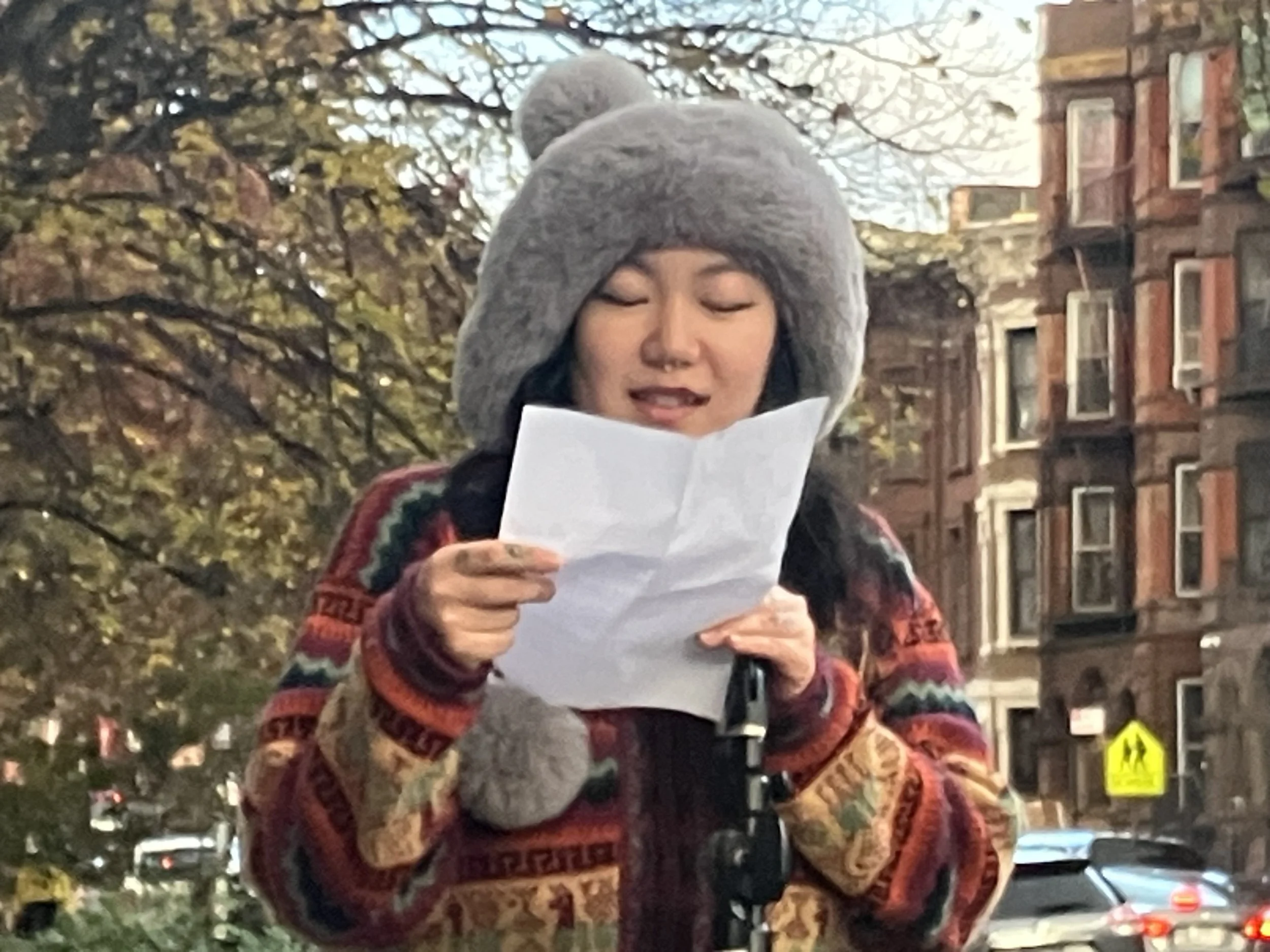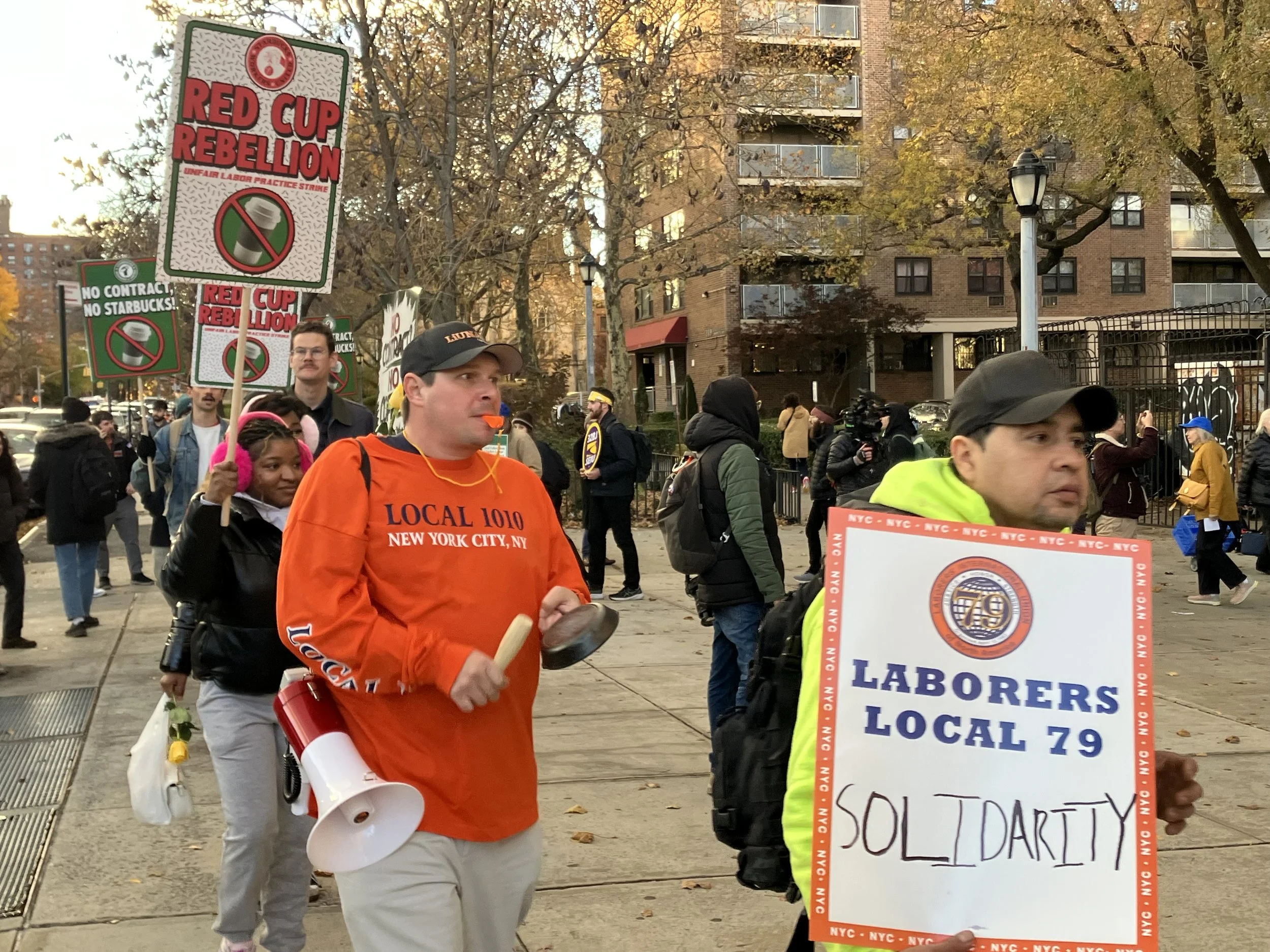Could the Starbucks ‘Red Cup Rebellion’ Turn Into Something More?
Starbucks baristas walked out across the country on Thursday promising the largest, longest strike in company history.” Could it turn into a general strike? Photos/Joe Maniscalco
By Joe Maniscalco
Starbucks baristas launched their “Red Cup Rebellion” this past week in more than 40 cities across the country promising to escalate the walkout until it becomes the “largest, longest strike in company history.”
Hard-pressed baristas struggling on poverty wages are demanding a fair contract and a resolution to a slew of unfair labor practice charges levied against the Seattle-based conglomerate.
But the walkout and rally outside the 325 Lafayette Avenue Starbucks in Brooklyn on Nov. 13 might’ve had the makings of something more, too—at least at some point.
“This goes beyond every employer, sector, and country,” barista Rey Saho told supporters on Thursday. “Every day, everywhere around the world, workers go on strike to defend themselves against the worsening conditions our bosses force on us. Every action, whether it’s a union vote, a walkout, or strike, is an act of rebellion against an unjust and exploitative system. And whether our follow workers realize it or not, these acts of rebellion are battles in a broader war.”
The clearly class-based and anti-capitalist rhetoric even had AFT President Randi Weingarten declaring, “It can’t just be their Red Cup Rebellion—it has to be all of our Red Cup Rebellion.”
Starbucks barista Rey Saho addresses supporters outside the company’s 325 Lafayette Avenue store in Brooklyn on Nov. 13.
With talk like that, how far away could a general strike—one that directly confronts the downward trajectory American workers are on—actually be? Is such an action even possible a year into Trump 2.0?
“God, I hope so,” Saho told Work-Bites on Thursday. “Why not? I know it’s not just me and my coworkers at Starbucks who are feeling the pressure and feeling fed up, and sick and tired of being sick and tired. I know it’s probably everyone working in fast-food, and it’s probably everyone working in hospitality, and service, and childcare, and educators,” too.
Thursday’s job action in Brooklyn saw support from the UFT, 32BJ SEIU, Laborers Local 79, and other trade unionists both active and retired.
“Right now, we’re sitting in New York City where everybody wants a more livable wage,” Local 79 organizer Alvaro Gonzalez told Work-Bites. “The price of everything keeps going up. And it’s very important that the wages go up, too. I always support people standing up and fighting for what they believe in—I wouldn’t be surprised if people stand up and get to that point [of a general strike].”
Talk about a general strike—as well as an overall awareness about what a general strike could be—is on the rise across the United States and Canada. UAW President Shawn Fain has already called on the labor movement to start gearing up for a general strike in 2028—but wildcat calls for a nationwide action went out during “No Kings” protests on Oct. 18, too.
New York City trade unionists showed their solidarity with Starbucks baristas in Brooklyn last Thursday.
And just last week, Alberta Federation of Labor President Gil McGowan had to apologize for failing to call a general strike in Canada three weeks ago after the government forced striking teachers back to work.
“We missed the opportunity,” he said.
Saho spent nearly a year clopening—or working back-to-back opening and closing shifts—at one of the only three unionized Starbucks in Durham, North Carolina before transferring to another store at 2 Broadway in lower Manhattan.
“I’ve been to so many pickets—not just my own,” Saho added. “At this point, I know that the general public is ready for a change. We’re ready to take our power back from the hands those that hold it all together and hoard it for themselves. I think if not now, when?”
New York State Assembly Member Claire Valdez [D-37th District] also framed the Starbucks Red Cup Rebellion in broader terms that go beyond the next round of contract talks.
“Your fight is every single workers’ fight,” she told Thursday’s rally. “When you fight for your trans co-workers to have health care, that is everyone’s fight. When you organize for Palestinian human rights, that is everyone’s fight.”
Pulling off a general strike is often portrayed as a complex and extremely daunting task, but Saho doesn’t think it has to be that way.
“I’m no expert,” they said. “But I also don’t think it needs to be too complicated. If we stand in solidarity with each other, if we turn to our fellow workers and we say, hey, I’m not gonna show up to work. And if you’re not gonna show up to work, we could really show the world and we could show our bosses who really runs this shit.”
No grand plan needed.
“I don’t think there needs to be a master plan,” Saho continued. “The way that our union organized was completely from the ground up—from baristas. We’re not trained in labor organizing—we are trained in making coffee and providing a service. For a lot of us, this is our first time on strike—and we’re doing it. If we can do it, anybody can.”
Startbucks CEO Brian Niccol raked in about $96 million in the first four months of 2024 alone. Last year, the ratio of his pay package to the median Starbucks barista was reportedly 6,666-to-1.
Another Starbucks worker at the Lafayette Avenue store in Brooklyn on Thursday said that some of her co-workers—unable to work enough hours to qualify for company benefits—are relying on SNAP and Medicaid to make ends meet.
“These billionaire bosses better know that the workers are ready to fight,” Assembly Member Valdez—a former UAW Local 2110 organizer—added. “Workers are organized in New York City against a fascist administration that wants to tell us that we don’t have the right organize and protect our co-workers.”



